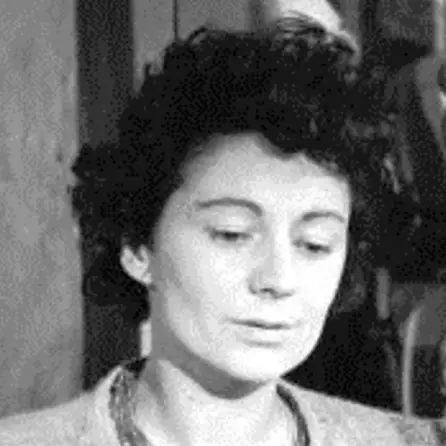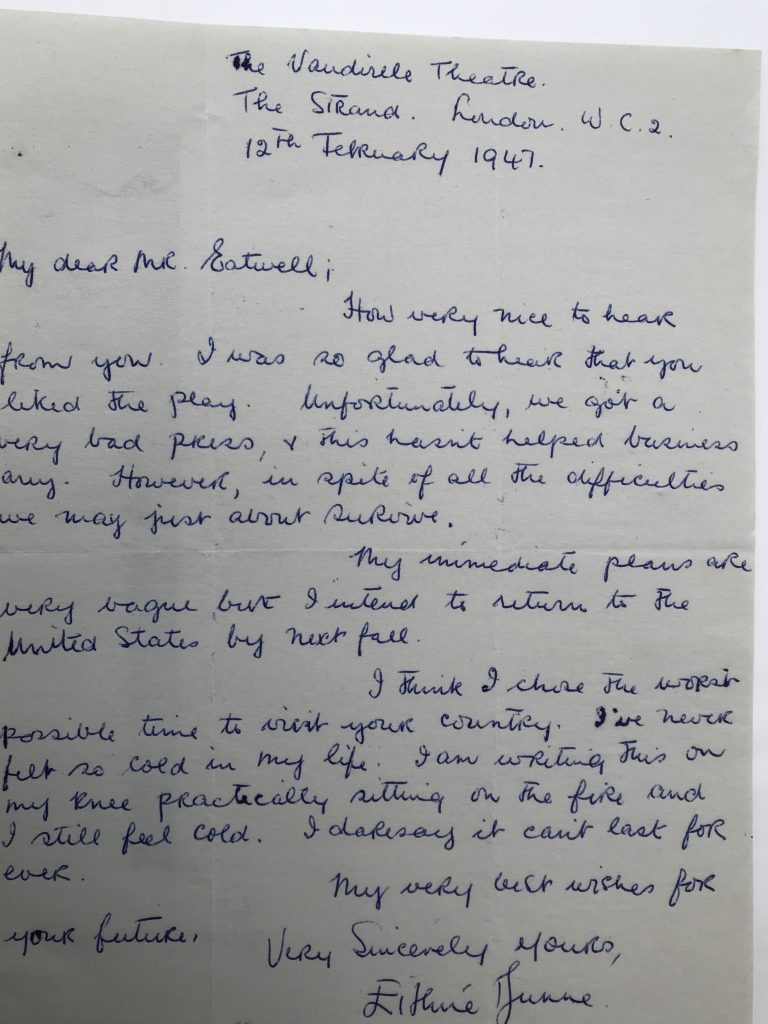
Wikipedia entry|:
She was born in Belfast, Northern Ireland.[1] She first started acting in Dublin and made her first appearances at the Abbey Theatre in 1939. She remained there for most of the 1940s. In the 1950s she performed at the Gate Theatre, after which she made her first appearance on Broadway.In 1960 she took part in the highly successful Abbey touring production of The Playboy of the Western World. In the mid-1960s she was resident and performed in a number of plays at the Old Vic, including Henry V, Othello, All In Good Time and The Rivals.[1] Although primarily a stage actress, she appeared in a number of TV series and motion pictures, including Shake Hands with the Devil, Dementia 13, and others.

Dictionary of Irish Biography.
Dunne, Eithne (1919–88), actress, was born 30 October 1919 in Market St., Belfast, daughter of Patrick Dunne, case maker, and Mary Dunne (née McDonnell). She began her theatrical career with the Abbey school of acting and established herself as a versatile performer alongside Cyril Cusack (qv), F. J. McCormick(qv), and Ria Mooney (qv) in the first productions of plays by Paul Vincent Carroll (qv) and George Shiels (qv). Although Francis Stuart’s ‘Strange guest’ was not well received on its production in 1940, her performance was praised, while in 1943 she acted in ‘Thy dear father’, the first play of Gerard Healy (qv) at the Abbey; she had married Healy in 1942. As well as her performances in the Abbey during the early 1940s, she appeared in Noel Coward’s ‘Blithe spirit’ as Elvira, and Cathy in a stage adaptation of ‘Wuthering Heights’. Early in 1945, she left the Abbey with a group of players, including Healy and Liam Redmond (qv), who were dissatisfied with the policies of the national theatre, which they regarded as neglecting indigenous playwriting talent. They subsequently formed the Players’ Theatre for the production of new Irish plays and achieved great success in the Cork Opera House and the Gate with Healy’s ‘The black stranger’; Dunne took the leading role. They had a disappointing following season, however, which saw the company’s demise.



The highlight of her subsequent career was probably her performance as Pegeen Mike in ‘The playboy of the western world’ by J. M. Synge (qv), opposite Burgess Meredith on Broadway in 1946–7. She received rave reviews and the production was staged at the Mercury Theatre, London, to further acclaim in 1948. From the mid 1940s through the 1950s her staples were part-time positions with the Radio Éireann Players and Longford Productions, the company founded by Micheál MacLiammóir (qv) and Hilton Edwards (qv). Opposite MacLiammóir’s Hamlet, she played a highly regarded Ophelia in their production at Elsinore (1952). She was praised for her portrayal of St Joan in Jean Anouilh’s play, ‘The lark’, directed by Edwards and MacLiammóir (1955), and she toured the Mediterranean with their company in 1955–6. She spent much of the 1960s with companies in Bristol and Nottingham, never becoming a regular on the London stage, although she was outstanding in a London production of Edna O’Brien’s ‘Cheap bunch of roses.’ In the 1950s and 1960s she augmented her stage career with work in cinema and television. Her first film performance was perhaps her best in No resting place (1950) with Noel Purcell (qv). Other screen appearances came in the risible stage-Irish production, She didn’t say no! (1958) and James Cagney’s Irish revolution thriller, Shake hands with the devil(1959). She returned to the Abbey in 1971 to take part in a Dublin theatre festival production of Tom Murphy’s ‘The morning after optimism’, for which she received good reviews as the prostitute Rosie.
She and Healy had one daughter, Anne. After playing to an enthusiastic audience in Hugh Leonard’s ‘Stephen D’ in London in 1963, Healy collapsed in the theatre and died. Eithne Dunne died 21 December 1988 in a London hospital



